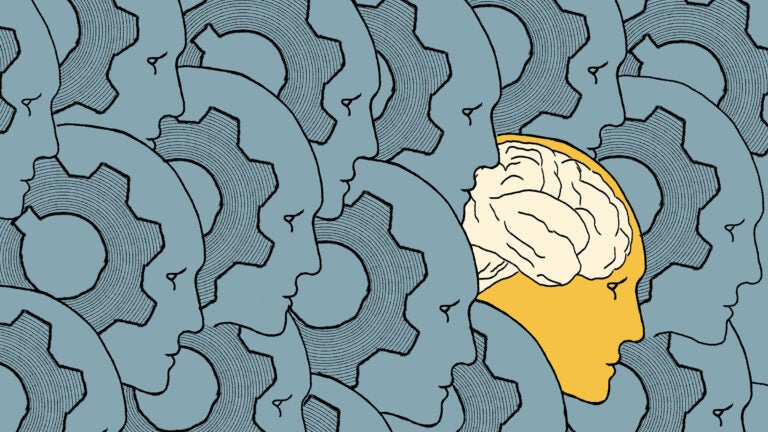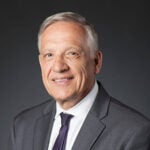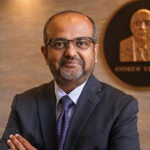The Institute on Ethics & Trust in Computing will create new educational, research and career opportunities for USC graduates through partnerships in the region’s tech sectors. (Illustration/iStock)
University
USC launches $12 million Institute on Ethics & Trust in Computing
The institute, supported by funds from the Lord Foundation of California, is the next step in the university’s effort to enhance research and education under the Frontiers of Computing “moonshot.”
USC is launching the Institute on Ethics & Trust in Computing, where experts will offer ethical guidance and resources to students and researchers on the development and applications of artificial intelligence and other technologies that are now commonplace across business and finance, health care, national security and science.
The new institute is supported by $12 million in funding by the Lord Foundation of California.
“USC is the place for innovation, with the interdisciplinary reach and expertise to drive advancements in computational science that benefit humanity,” USC President Carol Folt said. “Ethics must always remain at the center, and this important new institute guides future scientists to think deeply about the impact of their work. I’m grateful to the Lord Foundation for their foresight and support during this pivotal moment when AI is revolutionizing computing and society.”
|
|
“With its extraordinary advance, today’s technology is intertwined with humanity in a new ‘double helix.’ It is then crucial to understand how this interaction can help us solve the grand challenges of our time and to continue advancing our common humanity.”— Yannis C. Yortsos, USC Viterbi dean |
The institute builds on Folt’s Frontiers of Computing “moonshot” — a $1 billion-plus initiative that is the most comprehensive academic initiative in USC’s history — to consolidate USC’s position as a global leader in advanced computing research and education. The university has been a leading producer of computer science degrees in the nation among undergraduate and graduate students combined.
“USC’s computing initiatives have rapidly expanded, with 90 new faculty members expected by 2030, bringing together expertise in artificial intelligence, quantum computing, robotics and cybersecurity,” said Shrikanth Narayanan, vice president for presidential initiatives and USC University Professor, who will oversee the new institute. “Weaving ethics and trust across the full spectrum of computing research and education is at the core of this USC moonshot.”
|
|
“To create ethical computing systems, we need to embed ethical frameworks in their design. This is a central challenge that the institute will address.”— Gaurav Sukhatme, director of the USC School of Advanced Computing |
Leveraging USC’s unique location in the middle of Los Angeles and Southern California, along with the rising prominence of Silicon Beach — home of USC Information Sciences Institute and the USC Institute for Creative Technologies — this new institute will create new educational, research and career opportunities for USC graduates through partnerships in L.A.’s tech sectors.
Building ethics and trust in technology
Co-directed by faculty from the USC Dornsife College of Letters, Arts and Sciences and the USC Viterbi School of Engineering, the institute will foster greater multidisciplinary collaboration.
|
|
“The institute will empower USC students across disciplines … to engage with emerging technologies in ways that promote public trust and societal well-being.”— Yan Liu, institute co-director and USC Viterbi professor of computer science |
“By embedding research results in ethics focused on trustworthiness, safety and responsible AI development into advanced computing education, the institute will empower USC students across disciplines — from engineering and business to law, as well as media and philosophy — to engage with emerging technologies in ways that promote public trust and societal well-being,” said Yan Liu, a co-director of the institute and professor of computer science at USC Viterbi.
“A collaborative effort between the humanities and computer science is the ideal way forward,” said John Hawthorne, a co-director of the institute, as well as a Provost Professor of Philosophy who holds the Linda MacDonald Hilf Chair in Philosophy.
Hawthorne added: “AI is playing an increasingly important role in all aspects of society, including education, hiring decisions, probation recommendations, medical diagnoses and prognoses, loan decisions, stock trading and as a remedy for our felt need for companionship. This societal revolution raises profound questions.”
As governments, industry leaders and universities grapple with AI regulation and responsible technology integration, the new institute will further the university’s position as a thought leader in shaping policy and best practices.
|
|
“A collaborative effort between the humanities and computer science is the ideal way forward.”— John Hawthorne, institute co-director and Provost Professor of Philosophy |
In addition to offering opportunities for scientists and students to do a deeper exploration of ethics in computing, the institute will provide opportunities for scientists from peer institutions and members of the public to engage in dialogues about AI, blockchain, cybersecurity, data science and medical technology through conferences, webinars and other events.
A bold vision for the future
The institute will build upon and collaborate with USC’s existing initiatives, including the USC + Amazon Center on Secure & Trusted Machine Learning, the USC Center for AI in Society and the USC Center for Generative AI and Society.
|
|
“In our everyday experience, we know that trust must be earned. AI is no exception. This institute responds to some of the most urgent questions of our time: not just what we can build with AI, but what we should, and how to adopt it in an ethical and fair way.”— Moh El-Naggar, USC Dornsife interim dean |
Operating within the broader Frontiers of Computing moonshot and alongside the USC School of Advanced Computing, the new institute is a critical step toward ensuring computing technologies are developed responsibly.
With USC’s renowned expertise in AI, computing and interdisciplinary collaboration, the institute is poised to shape how industries and policymakers approach digital trust, security and ethical AI development for the foreseeable future.







